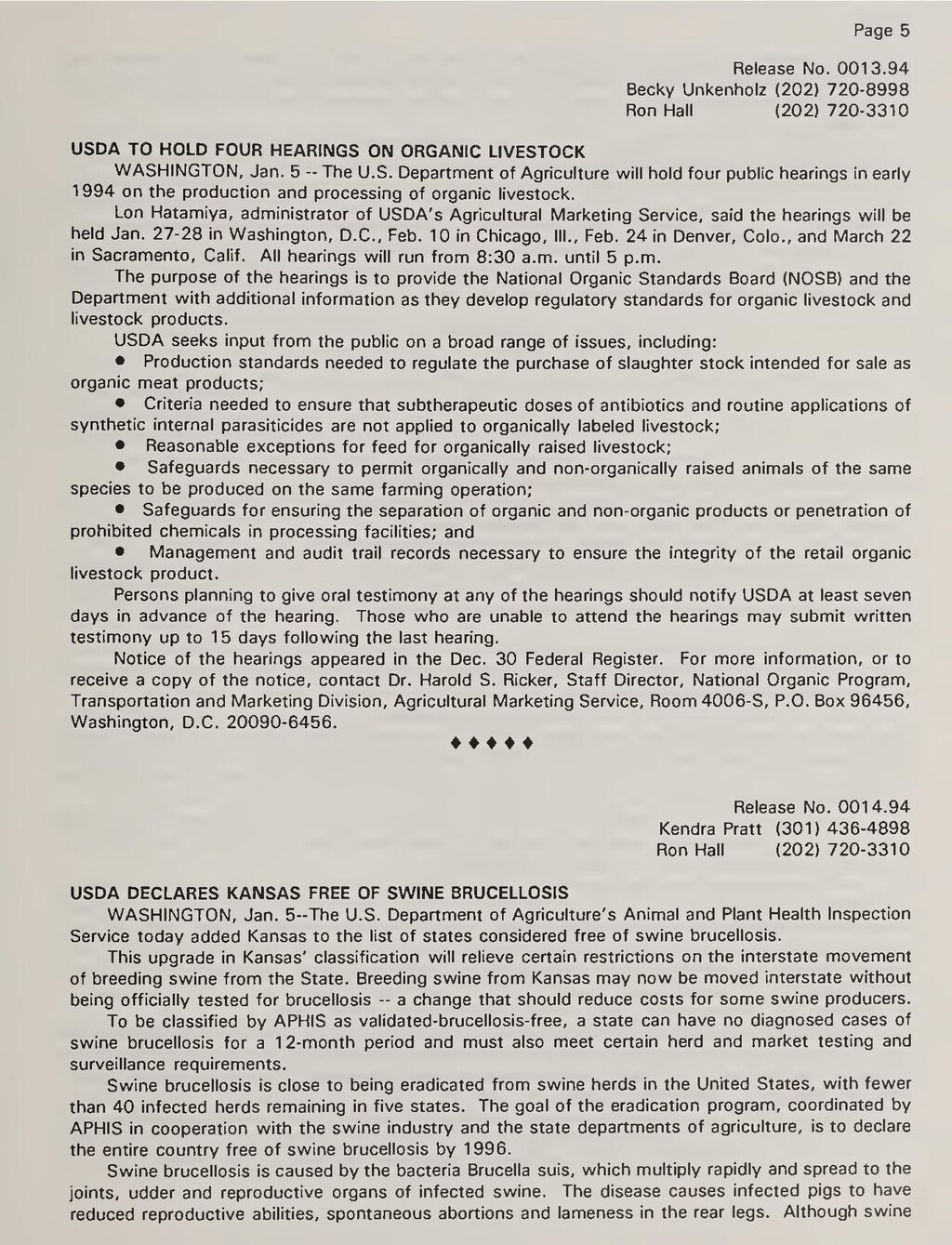Release No. 0013.94
Becky Unkenholz (202) 720-8998
Ron Hall (202) 720-3310
USDA TO HOLD FOUR HEARINGS ON ORGANIC LIVESTOCK
WASHINGTON, Jan. 5 -- The U.S. Department of Agriculture will hold four public hearings in early 1994 on the production and processing of organic livestock.
Lon Hatamiya, administrator of USDA's Agricultural Marketing Service, said the hearings will be held Jan. 27-28 in Washington, D.C., Feb. 10 in Chicago, Ill., Feb. 24 in Denver, Colo., and March 22 in Sacramento, Calif. All hearings will run from 8:30 a.m. until 5 p.m.
The purpose of the hearings is to provide the National Organic Standards Board (NOSB) and the Department with additional information as they develop regulatory standards for organic livestock and livestock products.
USDA seeks input from the public on a broad range of issues, including:
- Production standards needed to regulate the purchase of slaughter stock intended for sale as organic meat products;
- Criteria needed to ensure that subtherapeutic doses of antibiotics and routine applications of synthetic internal parasiticides are not applied to organically labeled livestock;
- Reasonable exceptions for feed for organically raised livestock;
- Safeguards necessary to permit organically and non-organically raised animals of the same species to be produced on the same farming operation;
- Safeguards for ensuring the separation of organic and non-organic products or penetration of prohibited chemicals in processing facilities; and
- Management and audit trail records necessary to ensure the integrity of the retail organic livestock product.
Persons planning to give oral testimony at any of the hearings should notify USDA at least seven days in advance of the hearing. Those who are unable to attend the hearings may submit written testimony up to 15 days following the last hearing.
Notice of the hearings appeared in the Dec. 30 Federal Register. For more information, or to receive a copy of the notice, contact Dr. Harold S. Ricker, Staff Director, National Organic Program, Transportation and Marketing Division, Agricultural Marketing Service, Room 4006-S, P.O. Box 96456, Washington, D.C. 20090-6456.
♦ ♦ ♦ ♦ ♦
Release No. 0014.94
Kendra Pratt (301) 436-4898
Ron Hall (202) 720-3310
USDA DECLARES KANSAS FREE OF SWINE BRUCELLOSIS
WASHINGTON, Jan. 5--The U.S. Department of Agriculture's Animal and Plant Health Inspection Service today added Kansas to the list of states considered free of swine brucellosis.
This upgrade in Kansas' classification will relieve certain restrictions on the interstate movement of breeding swine from the State. Breeding swine from Kansas may now be moved interstate without being officially tested for brucellosis -- a change that should reduce costs for some swine producers.
To be classified by APHIS as validated-brucellosis-free, a state can have no diagnosed cases of swine brucellosis for a 12-month period and must also meet certain herd and market testing and surveillance requirements.
Swine brucellosis is close to being eradicated from swine herds in the United States, with fewer than 40 infected herds remaining in five states. The goal of the eradication program, coordinated by APHIS in cooperation with the swine industry and the state departments of agriculture, is to declare the entire country free of swine brucellosis by 1996.
Swine brucellosis is caused by the bacteria Brucella suis, which multiply rapidly and spread to the joints, udder and reproductive organs of infected swine. The disease causes infected pigs to have reduced reproductive abilities, spontaneous abortions and lameness in the rear legs. Although swine
